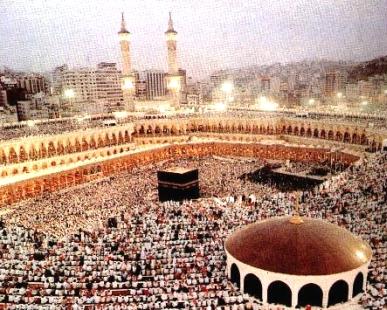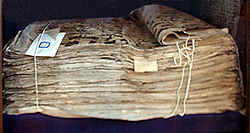
Islam

Muhammad's Life:
The term "Islam" is a verb form of the word "salima", meaning "to be safe." Its religious significance or meaning is "entire surrender of the will to God". The followers of Islam are called are called Muslim, which means "those who have surrendered themselves", or "believers" of the Divine message. Historically one became a Muslim by following the teachings of Mohammed. However, most Muslims believe that Islam has always existed, being revealed to humanity through a series of prophets which culminated in the final and complete word of Muhammad.
Muhammad himself was born in Mecca, a large Saudi Arabian trading city, in 570AD. Though little is known of Mohammad's life prior to about 610, he was a member of one of the region's dominant tribes, the Qu'raish. He married a rich widow, had a daughter, Fatima, and saw her married to a prominent warrior. Sometime around 610, Muhammad began to tell a story about his experiences mediating in the desert in a cave on Mount Hira. He claimed that the angel Gabriel had appeared to him to reveal to God's messages, and to call on Muhammad to publish the revelations. These revelations were the first of many Muhammad spoke of in his life. Muhammad began to preach to those around him, which he saw as completing the work of the Jewish and Christian prophets. However, his message of there being no God but Allah, and that life should be lived in complete submission to the will of Allah, was not popular at first. The dominant religion in Mecca at the time was called Ka'aba, or "black stone." In fact, practitioners of Ka'aba literally worshipped a black stone, and held that various other objects, as well as the black stone, possessed spirits and power. As a result, Muhammad was thought a false prophet, or even possessed. In 622 he had to leave Mecca with many of his followers for a rival city, Medina, because he had been condemned by the local authorities. Muhammad's flight is often referred to as "the year of the Hegira" ("Flight") and serves as the first year in the Muslim calendar.
In Medina, Muhammad's following grew fairly large and he
eventually struck out from Medina and captured Mecca in a holy war around
630AD. As the ruler of Mecca, Muhammad legislated the divine orders that
were his message, including a pilgrimage to Mecca as part of a practitioner's
religious duties. By the time Muhammad died in 632AD the majority of the Arabian Peninsula under
his rule and the religion of Islam. After Muhammad's death the Qur'an was
written as a record of his revelations.
God/Gods:
Muslims recognize the existence of a supreme and unique God,
Allah, who created and rules all things. According to Muslims Allah is eternal, omniscient, and
omnipotent. Additionally, Allah has neither shape nor form, lacks gender,
and cannot be seen or heard. Allah is just, meaning Allah rewards
obedience and punishes disobedience fairly. Finally, Allah is merciful as
well.
Origin of Universe and Life:
Allah created the universe and it follows the course he has predestined.
After Death:
The Qur’an vividly describes a heaven, Al-Janna, for those who believe Islamic teaching and do righteous deeds. Likewise, nonbelievers and those who commit unrighteous acts face severe punishment in hell. The Qur'an discusses Al-Janna in some detail, describing eight levels of Paradise, most levels are described as gardens with reclining couches, abundant fruits, food, spring water, goblets of silver, etc.. Though a common belief about Al-Janna, the Qur'an does not suggest that Al-Janna includes martyrs being waited upon by virgins. This idea seems to have its genesis in the Hadith, a canon of sayings and stories attributed to Muhammad and other prophets.
Is there Evil in the World, and Why?
Islam sees humanity as being neither inherently sinful nor inevitably good. People possess the capacity for both good and evil. Islam teaches that Allah granted humanity freewill in order for each person to show their faith through their actions. Nevertheless, human beings are thought to be weak and to regularly sin.
Central Doctrines:
The central idea and practice behind Islam is obedience to Allah's will.
The most important obligations in Muslim practice are the "Five Pillars of Islam,"
and each Muslim must meet these obligations to live a good life.
The Five Pillars
Shahadah: reciting the Muslim profession of faith with sincerity and earnestness
Salat: ritual prayers five times each day
Zakat: paying an alms tax to benefit the poor and the needy
Sawm: fasting each year during the month of Ramadan
Hajj: making at least one pilgrimage to Mecca
History of the Qur'an:
Traditionalist scholars hold that beginning with Muhammad's revelations in 610AD the verses of the Qur'an were codified through oral history (memorization) and written down during Muhammad's lifetime. The written verses were combined shortly after Muhammad's death. The verses of the Qur'an were, according to traditional Muslim history, written down and memorized during his life on palm trees and fiber, copies where sent to other cities, and collected shortly after his death. During the caliphate (religious state) of caliphate of Uthman ibn Affan the Qur'an was standardized. Some small revisions in punctuation and lettering during the seventh and eighth centuries, mark the last alterations of the Qur'an.
Some scholars suggest that Uthman ibn Affan's standardization was in fact a recension, i.e., a critically inspired editing or revision--often from a family of manuscripts. No known copies of the Qur'an exist from this time or prior. The actual date of the oldest known copy is disputed, ranging from the 7th to the 9th centuries.
 |
| Earliest known (incomplete) copy of the Qur'an keep in Tashkent in Uzbekistan from Wikipedia http://en.wikipedia.org/wiki/File:Uthman_Koran_Taschkent_a.jpg |
Many scholars point to contemporary texts from non-Muslim cultures as well as evidence from contemporary linguistic analysis to argue that the Qur'an and Islam developed over a longer period of time and from many people, possibly inspired by or even derived from earlier Christian Aramaic texts.
Islam Links